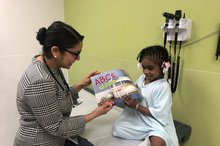Found 142 resources.
0
0
0

When following the mother–child pair from pregnancy through five years postpartum, the estimated cost is $14.2 billion for births in 2017, or an average of $32,000 for every mother–child pair affected but not treated.
Topics: Dual-generation, Early childhood, Mental health, Pre-natal, Research
 Shared by Housing Is
on Apr 30, 2019
Shared by Housing Is
on Apr 30, 2019 0
0
0
Self-paced courses for home visitors and supervisors and webinars that cover: the basics of home visiting, foundations of infant mental health in home visiting, domestic violence in home visiting, substance abuse in home visiting, the impact of trauma on home visiting, building engaging and collaborative relationships with families, and home visiting with families during pregnancy.
Topics: Child welfare, Early childhood, Health, Home visiting
 Shared by Housing Is
on Apr 29, 2019
Shared by Housing Is
on Apr 29, 2019 0
0
0
Sweeping changes designed to make the food more nutritious in a federal assistance program for low-income families reduced the risk for obesity for 4-year-olds who had been on the program since birth, according to new research.
Topics: Early childhood, Food insecurity, Low-income, Nutrition, Obesity, Research
 Shared by Housing Is
on Apr 29, 2019
Shared by Housing Is
on Apr 29, 2019 0
0
0
A growing body of research suggests that housing eviction is more common than previously recognized and may play an important role in the reproduction of poverty. The proportion of children affected by housing eviction, however, remains largely unknown. We estimate that one in seven children born in large U.S. cities in 1998–2000 experienced at least one eviction for nonpayment of rent or mortgage between birth and age 15. Rates of eviction were substantial across all cities and demographic groups studied, but children from disadvantaged backgrounds were most likely to experience eviction....
Topics: Early childhood, Homelessness, Housing, Low-income, Racial inequalities, Research
0
0
0
Education Design Lab taps four large community colleges in an ambitious effort to raise single-mother completion rate 30 percent at each institution by 2024.
Topics: Dual-generation, Early childhood, Family engagement, Low-income, Metrics, Post-secondary
0
0
0

Founded in 1995 as Project Women, Family Scholar House (FSH) provides comprehensive, holistic services for disadvantaged single parents, their children, and foster alumni. The nonprofit seeks to end the cycle of poverty and transform communities by empowering families and youth to succeed in education and life-long self-sufficiency. FSH provides supportive housing, educational programming, and participant advocacy to help families gain independence.
Topics: Dual-generation, Early childhood, Education, Homelessness, Housing, Low-income, Partnerships, Place-based, Post-secondary, South, Stability
0
0
0

For 17 years, physicians, nurse practitioners and pediatric residents at our hospital, and presently, at more than 80 locations throughout the region, have been participating in Reach Out and Read of Greater Philadelphia (www.reachoutandreadphilly.org), a simple yet profound way to harness the power of a book to potentially alter a child’s health trajectory.
Topics: Early childhood, East Coast, Education, Grade-level proficiency, Health, Literacy, Low-income
 Shared by Housing Is
on Apr 18, 2019
Shared by Housing Is
on Apr 18, 2019 0
0
0
With 22 percent of the undergraduate student population comprised of parents, policymakers and institutions must explore the unique needs of this population and address the challenges that may prevent parents from attaining their degree. This includes determining what systems, services, and approaches best support their mental health needs. This brief examines opportunities for policymakers and academic institutions to adapt existing mental health services in order to meet the unique needs of students who are parents and help them complete their degree.
Topics: Dual-generation, Early childhood, Mental health, Post-secondary
0
0
0
Investments in the postsecondary success of parents with young children can increase attainment of credentials leading to good jobs, bring children the benefits of high-quality learning environments, promote later college-going among children, and improve family economic security across generations. This factsheet provides figures on the student parent population based on the latest National Postsecondary Student Aid Study data.
Topics: Dual-generation, Early childhood, Post-secondary, Research, Youth
0
0
0
Senate Democrats, led by Sherrod Brown (OH), Michael Bennet (CO), Dick Durbin (IL), and Ron Wyden (OR), has introduced a new bill that would establish a child allowance for the first time in American history and substantially increase the size of the Earned Income Tax Credit for low-income people.
Topics: Early childhood, Legislation & Policy, Low-income, Research
 Shared by Housing Is
on Apr 10, 2019
Shared by Housing Is
on Apr 10, 2019 0
0
0

Houston children continue to be poisoned by lead even though childhood lead poisoning is considered the most preventable environmental disease among young children. In the past three years, almost 1,200 Houston children between 0 and 72 months old were found to have lead in their blood above the reference value of concern set by Centers for Disease Control and Prevention. The Houston Health Department (HHD) has hosted the Lead-Based Paint Hazard Control Program (LBPHCP) for over 25 years, with the goal of providing a lead-safe home environment through home investigations and home lead...
Topics: Early childhood, Health, Housing, Lead, Partnerships, Safety
 Shared by Housing Is
on Apr 8, 2019
Shared by Housing Is
on Apr 8, 2019 0
0
0

The nonprofit LIFT Orlando and AdventHealth have started construction on a “first of its kind” early learning center in the long-neglected West Lakes neighborhood south of Camping World Stadium, with an opening expected by August. The center will provide basic education as well as health and wellness programs, an on-site doctor or advanced nurse practitioner, mental health counseling and other services beyond the classroom. It can enroll up to 220 children from age 6 weeks to 5 years, with half of the openings reserved for kids from the West Lakes area, who will be accepted regardless of...
Topics: Child welfare, Early childhood, Education, Health, Low-income, Partnerships, Place-based
 Shared by Housing Is
on Apr 4, 2019
Shared by Housing Is
on Apr 4, 2019 0
0
0
The Homeless Children and Youth Act of 2019 (H.R. 2001) is a bipartisan bill that removes barriers to U.S. Department of Housing and Urban Development (HUD) homelessness assistance for children, youth and families in the following ways.
Topics: Early childhood, Homelessness, Housing, Legislation & Policy, Youth
 Shared by Housing Is
on Apr 4, 2019
Shared by Housing Is
on Apr 4, 2019 0
0
0

Managing director of Ascend at the Aspen Institute discusses the role of women in public health policy-making
Topics: Dual-generation, Early childhood, Family engagement, Mental health, Pre-natal, Research
0
0
0
Resources from Ascend at The Aspen Institute
Topics: Asset building, Child welfare, Dual-generation, Early childhood, Family engagement, Research, Youth
0
0
0
Low-income immigrant mothers are skipping the chance to get nutritious foods and help for their infants from a federal program because they fear deportation, or the loss of their children, according to the agencies that distribute those benefits.
Topics: Child welfare, Early childhood, Food insecurity, Health, Legislation & Policy, Nutrition
0
0
0
Released bi-monthly, each issue of the ZERO TO THREE Journal focuses on a critical topic within the early childhood development field. Journal articles are carefully composed to present current knowledge, latest research, and practical advice to help early childhood professionals do their best work in support of infants and toddlers.
Topics: Child welfare, Dual-generation, Early childhood, Homelessness, Housing, Low-income, Research, Safety
0
0
0
Homelessness during pregnancy poses significant health risks for mothers and infants. As health care providers increase their emphasis on social determinants of health, it is important to understand how unstable housing contributes to complications during pregnancy. We linked data about emergency shelter enrollees with Massachusetts Medicaid claims for the period January 1, 2008–June 30, 2015 to compare health care use and pregnancy complications for 9,124 women who used emergency shelter with those for 8,757 similar women who did not. Rates of mental illness and substance use disorders were...
Topics: Child welfare, Depression, Early childhood, Homelessness, Housing, Low-income, Mental health, Pre-natal, Research, Substance abuse
 Shared by Housing Is
on Mar 26, 2019
Shared by Housing Is
on Mar 26, 2019 0
0
0
This brief presents a new approach to support the development of early math skills in young children. The approach synthesizes the influence of parents, home environment, and children’s health care providers. The brief draws on research to explain (1) why it is important to support early math development, (2) what early math is (and isn’t), (3) how early math and literacy development intertwine, and (4) the important role parents play in their child’s development. The brief ends with a description of a promising approach to support early childhood math development that leverages communication...
Topics: Child welfare, Early childhood, Education, Health, Literacy, Partnerships
 Shared by Housing Is
on Mar 18, 2019
Shared by Housing Is
on Mar 18, 2019 0
0
0
Findings from a national descriptive study of Early Head Start-Child Care Partnerships reveal new information about how partnerships expand access to high quality, affordable care for infants and toddlers. The study describes characteristics of these partnerships, including how they were formed and operated, as well as strategies for implementing partnerships in both center-based child care and family child care homes. It also describes the wide range of services that partnerships offer to children and families who receive care through Early Head Start-Child Care Partnership grant funds....
Topics: Child welfare, Early childhood, Low-income, Research
 Shared by Housing Is
on Mar 15, 2019
Shared by Housing Is
on Mar 15, 2019 0
0
0
Democrats this week announced new legislation that would slash child poverty by paying low-income parents the kind of monthly allowance that is standard in other developed countries. But the lawmakers who introduced the bill, called the American Family Act, didn’t use the terms “child benefit” or “child allowance” at their Capitol Hill press conference Wednesday. Instead, they all called it a tax credit or a tax cut.
Topics: Child welfare, Dual-generation, Early childhood, Funding, Legislation & Policy, Low-income, Research
 Shared by Housing Is
on Mar 12, 2019
Shared by Housing Is
on Mar 12, 2019 0
0
0
Child poverty in the U.S. could be cut in half over the next 10 years with a few simple steps, according to a new report from the National Academies of Sciences, Engineering and Medicine. The cost would be high — at least $90 billion a year. But the National Academies report warns that the price of not doing anything would be far greater.
Topics: Child welfare, Criminal justice, Early childhood, Education, Food insecurity, Funding, Health, Immigrants, Legislation & Policy, Low-income, Nutrition, Racial inequalities
 Shared by Housing Is
on Mar 12, 2019
Shared by Housing Is
on Mar 12, 2019 0
0
0

The number of kids enrolled in Medicaid and the Children’s Health Insurance Program (CHIP) — two government health plans for the poor — fell by nearly 600,000 in the first 11 months of 2018, a precipitous drop that has puzzled and alarmed many health policy analysts, while several states say it reflects the good news of an improving economy.
Topics: Affordable Care Act, Child welfare, Early childhood, Health, Legislation & Policy, Low-income, Medicaid / Medicare, Research, Youth
 Shared by Housing Is
on Mar 8, 2019
Shared by Housing Is
on Mar 8, 2019 0
0
0
This report looks at school breakfast participation and policies in 76 large school districts across the country to evaluate successful practices in reaching more low-income children with school breakfast. This is a companion report to the School Breakfast Scorecard. Also check out our interactive school breakfast participation map.
Topics: Child welfare, Early childhood, Education, Food insecurity, Low-income, Nutrition
 Shared by Housing Is
on Mar 1, 2019
Shared by Housing Is
on Mar 1, 2019 0
0
0
This week, the Food Research & Action Center in Washington, D.C., published its annual School Breakfast Scorecard, analyzing school breakfast participation throughout the country for the 2017-2018 school year. Here are six things to know from the report.
Topics: Early childhood, Education, Food insecurity, Health, Nutrition, Youth
 Shared by Housing Is
on Feb 25, 2019
Shared by Housing Is
on Feb 25, 2019 